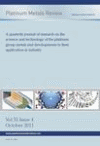Platinum Metals Review - Volume 12, Issue 4, 1968
Volume 12, Issue 4, 1968
-
-
Sliding Noble Metal Contacts
More LessAuthors: BY A. S. Darling, and G. L. SelmanWhen, as in many low torque potentiometers, contact pressures must not exceed a few grams the use of noble metals for both resistance wire and wiping contact becomes almost essential. As the factors that determine the electrical and mechanical behaviour of such low load sliding contacts have not yet been established, wiper/slidewire combinations are still selected on an empirical basis. This paper, based on a lecture recently delivered to the Fourth International Research Symposium on Electrical Contact Phenomena at Swansea, describes some results obtained on an apparatus in which the abrasion resistance and frictional characteristics of precision resistance alloys can be assessed in an objective manner at very low contact loads. Under such conditions metal is transferred from wiper to resistance alloy and the efficiency of this transfer process determines the electrical behaviour of these sliding contacts.
-
-
-
Platinum Metal Contacts
More LessBy J. C. C.Platinum metals and their alloys featured in many of the fifty papers presented at the Fourth International Symposium, sponsored jointly by the Institute of Physics and the Physical Society and the Institution of Electrical Engineers, held in July at the University College of Swansea.
-
-
-
Nitrosyl Complexes of the Platinum Metals
More LessBy By M. J. Cleare,In recent years much research has been carried out on platinum group metal complexes, especially those containing the carbonyl ligand. As the nitrosyl group is a nitrogen bonded ligand which in its normal mode of bonding is isoelectronic with carbon monoxide, the chemistry of complexes containing co-ordinated nitric oxide is interesting, and they may have similar potential uses to the carbonyl complexes. This article outlines our present knowledge of the nitrosyl complexes and their mode of bonding.
-
-
-
Fourth International Congress on Catalysis
More LessBy G. C. B.The Fourth International Congress on Catalysis took place in Moscow during the last week in June, and was followed by three specialised Symposia, two of which were also held in Moscow and one in Novosibirsk. This Congress provided, as did its predecessors, a useful forum for the exchange of ideas and experience: an impression of the Congress and a review of the papers relevant to the platinum metals is given in this article.
-
-
-
Hydrogen in Palladium and its Alloys
More LessBy BY F. A. LewisA symposium organised by Professor E. Wicke and Professor T. B. Flanagan on the general topic of ’Hydrogen in Transition Metals’ was held in July at the Institute für Physikalische Chemie of the University of Münster. Most of the papers presented were concerned with palladium or its alloys and a brief review of these contributions is given here.
-
-
-
The First Platinum Refiners
More LessBy By Donald McDonaldCredit must undoubtedly be given to the arsenic process of removing base metals from native platinum, and principally to its practice by Janety, the Master Goldsmith of Paris, in the years just before and during the French Revolution for leading to the first real exploitation of platinum as an industrial metal and for enabling its properties to be fully appreciated.
-
Volumes & issues
-
Volume 58 (2014)
-
Volume 57 (2013)
-
Volume 56 (2012)
-
Volume 55 (2011)
-
Volume 54 (2010)
-
Volume 53 (2009)
-
Volume 52 (2008)
-
Volume 51 (2007)
-
Volume 50 (2006)
-
Volume 49 (2005)
-
Volume 48 (2004)
-
Volume 47 (2003)
-
Volume 46 (2002)
-
Volume 45 (2001)
-
Volume 44 (2000)
-
Volume 43 (1999)
-
Volume 42 (1998)
-
Volume 41 (1997)
-
Volume 40 (1996)
-
Volume 39 (1995)
-
Volume 38 (1994)
-
Volume 37 (1993)
-
Volume 36 (1992)
-
Volume 35 (1991)
-
Volume 34 (1990)
-
Volume 33 (1989)
-
Volume 32 (1988)
-
Volume 31 (1987)
-
Volume 30 (1986)
-
Volume 29 (1985)
-
Volume 28 (1984)
-
Volume 27 (1983)
-
Volume 26 (1982)
-
Volume 25 (1981)
-
Volume 24 (1980)
-
Volume 23 (1979)
-
Volume 22 (1978)
-
Volume 21 (1977)
-
Volume 20 (1976)
-
Volume 19 (1975)
-
Volume 18 (1974)
-
Volume 17 (1973)
-
Volume 16 (1972)
-
Volume 15 (1971)
-
Volume 14 (1970)
-
Volume 13 (1969)
-
Volume 12 (1968)
-
Volume 11 (1967)
-
Volume 10 (1966)
-
Volume 9 (1965)
-
Volume 8 (1964)
-
Volume 7 (1963)
-
Volume 6 (1962)
-
Volume 5 (1961)
-
Volume 4 (1960)
-
Volume 3 (1959)
-
Volume 2 (1958)
-
Volume 1 (1957)
Most Read This Month

Most Cited Most Cited RSS feed
-
-
Metal-Ligand Exchange Kinetics in Platinum and Ruthenium Complexes
By By Jan Reedijk
-
-
-
The Preparation of Palladium Nanoparticles
By By James Cookson
-
-
-
Diesel Engine Emissions and Their Control
By By Tim Johnson
-
-
-
Recycling the Platinum Group Metals: A European Perspective
By By Christian Hagelüken
-
-
-
A Healthy Future: Platinum in Medical Applications
Authors: By Alison Cowley and and Brian Woodward*
-
-
-
Palladium-Based Alloy Membranes for Separation of High Purity Hydrogen from Hydrogen-Containing Gas Mixtures
Authors: By Gennady S. Burkhanov, Nelli B. Gorina, Natalia B. Kolchugina, Nataliya R. Roshan, Dmitry I. Slovetsky and Evgeny M. Chistov
-
-
-
A Review of the Behaviour of Platinum Group Elements within Natural Magmatic Sulfide Ore Systems
Authors: By D. A. Holwell and I. McDonald
-
-
-
Platinum as a Reference Electrode in Electrochemical Measurements
Authors: By Kasem K. Kasem and Stephanie Jones
-
-
-
Carbon Nanotubes as Supports for Palladium and Bimetallic Catalysts for Use in Hydrogenation Reactions
Authors: R. S. Oosthuizen and V. O. Nyamori
-
- More Less

